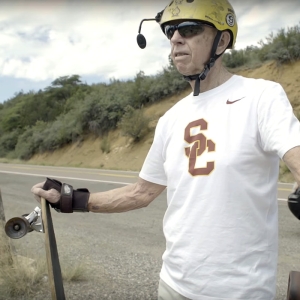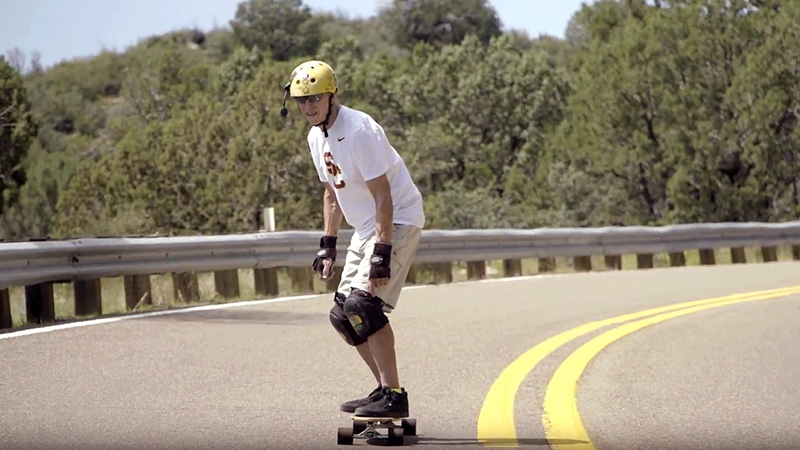Love, Work and Exercise
April 09, 2018 / by Jacqueline Mazarella- Alumni
- Giving
On June 6, 1963, Bill Wennerholm, MSW ’66, sat in the sixth row of his undergraduate commencement ceremony in San Diego, California. The keynote speaker urged the graduating class to take the hard-earned gift they were receiving that day and use it for the good of their fellow man. The speaker was President John F. Kennedy, and Wennerholm felt the president was talking directly to him.
Inspired by Kennedy’s words, Wennerholm set out on his mission of service. He took a position in child welfare at the San Diego County Welfare Department. It was there that he encountered USC social work professor John Milner, who taught a course at the welfare department as part of a special program. The two men had a chance conversation over a private stroll one day.
“He could read my heart,” Wennerholm said, recalling a poignant moment with Milner. “He recognized that I had a calling to be a helper and an agent of change. He told me I should see him when I was ready for graduate school.”
Wennerholm did not think he had the grades for such an endeavor, but he took Milner up on his invitation. Milner convinced him to take the graduate aptitude exam at USC. He aced it, and was accepted into the 1964 class to pursue his Master of Social Work (MSW).
“USC took a chance on me so I could be a caring presence in the lives of people,” Wennerholm said.
|
At 78, Bill Wennerholm, MSW '66, is still an active cyclist, skateboarder and clinician... and donor to the USC Suzanne Dworak-Peck School of Social Work. |
Continuing the Mission
A man of faith, Wennerholm spent his first post-graduate decade as the adolescent director at Hollywood Presbyterian Church, focusing on outreach to kids in junior high school. While there, he had the privilege of working closely with fellow Trojan, WWII hero and Olympic athlete Louis Zamperini.
They became dear friends, and for Wennerholm, the real story of the man is not about the hero or the athlete, but the person of faith and forgiveness. “Louie gave me the gift of humility,” Wennerholm said.
For more than a half-century, Wennerholm has been using his gifts and his education in full-time clinical practice. Based in Prescott, Arizona, he still continues to see over 45 clients a week.
“If you happen to visit, make sure you say ‘Prescott’ like ‘biscuit,’” Wennerholm said. “Otherwise the locals will know you’re a tourist!”
A Poster Child for Healthy Aging
For Wennerholm, providing care and being a catalyst for change have always begun with ensuring he is in the best shape possible, mentally and physically. To that end, Wennerholm, 78, rides over 240 miles a week on his bike, and has been on a low-fat diet without eggs, meat or cheese for 45 years. He makes one exception every year on his birthday: riding his bike 100 miles to Flagstaff for a pizza.
Weekends, however, are for “bombing hills” on his skateboard. As a little boy, Wennerholm would nail metal skates onto a two-by-four to mimic a longboard. Now he has been sponsored by Sector 9 Skateboard Company for the past 15 years. The freedom of being on a longboard is an almost religious experience for him, and he is grateful to still be able to do it.
“I’ll admit it’s hugely dangerous,” Wennerholm said. “But there can also be huge benefits to putting yourself on the edge sometimes.”
His Heart is Still in Troy
Recently, Wennerholm and his wife of 51 years, Susan Farwell Wennerholm, MSW ’67, made a planned gift to the USC Suzanne Dworak-Peck School of Social Work.
For Wennerholm, his start at USC provided the foundation on which to build his career, and he now feels it is important to support the school because it continues to be innovative in the field, focused on cutting-edge training and unique in offering interdisciplinary degrees.
The endowment the Wennerholms have left will be in honor of John Milner, the professor who mentored Wennerholm.
“Hopefully it will enable the university to take a chance on somebody who needs financial resources,” Wennerholm said, “so that they can be a caring presence in the way that they are called, within the spectrum of social work.”
To reference the work of our faculty online, we ask that you directly quote their work where possible and attribute it to "FACULTY NAME, a professor in the USC Suzanne Dworak-Peck School of Social Work” (LINK: https://dworakpeck.usc.edu)

